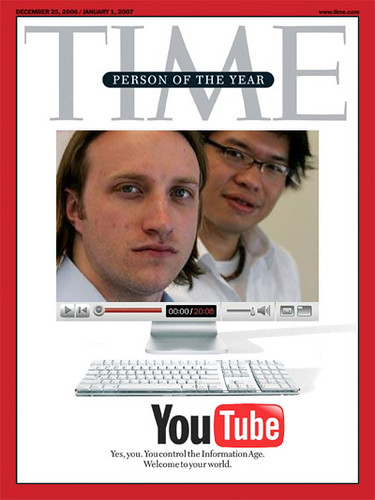
Today, I spoke with Pete Blackshaw and it was tremendous. This is certainly one of my favorite interviews to date, out of over 50! Pete is the man who coined “consumer-generated media.” He’s also a top executive at Nielsen, an author, speaker, cofounder of the Word-of-Mouth Marketing Association, a columnist and much more. It’s hard to keep up with Pete, just like it’s probably difficult to keep up with me (but at a higher level). You can follow him on Twitter or subscribe to his blog. Today, we go over the importance of word-of-mouth, and what companies and individuals should start doing about the conversations that ARE ALREADY taking place on the internet.
Pete, you coined the term “consumer-generated media.” Where did you come up with that name and what fvalue do you put on being a content producer, not just consumer?
About five or six years ago, the name just slapped me in the face while thinking hard about how to best communicate the concept of how user content is shaping the new landscape. At times I worried we were being too abstact and “technical” in how we communicated the value and importance of internet monitoring, and CGM seems to solve that answer. I was also looking for something that sounded a bit like CPG to make the concept more media-centric.
Also, I presumed a big tent under the word “consumer,” and that includes all other content creators. The use of the term “media” is quite deliberate, and I really wanted to underscore that the content consumers create acts like “media” in the product awareness, trial, and consideration stages. It especially acts like media in search results, a point I underscore quite emphatically in my book. There’s absolutely no question there’s a media effect going on when negative experiences spill across the web.
There are now countless examples of companies who monitor customer complains online. For instance, GoDaddy shut my websites now (3 of them) and I tweeted about it. After 24 hours I got a phone call from a man who apologized and told me that he will help next time via Twitter. What happens when a company ignores these conversations? What impact does it have on their bottom line?
“Companies that ignore these conversations merely increase the odds of the bad news spreading.”
Remember, consumers tell others because they often feel like the company is ignoring them. Negative word-of-mouth often serves an almost ‘cathartic need.’ As for the bottom line, you can look at the impact in many different ways. Keeping customers loyal is always a good investment strategy, and social media and CGM afford us a unique and powerful lens into new dimensions of consumer loyalty. If the research studies are correct that consumers trust other consumers more than advertisers in their buyer behavior, there’s no possible way to unpack ROI from CGM.
media and CGM afford us a unique and powerful lens into new dimensions of consumer loyalty. If the research studies are correct that consumers trust other consumers more than advertisers in their buyer behavior, there’s no possible way to unpack ROI from CGM.
In 5-10 years, do you think every company will have a blog, Twitter account, page on Facebook, etc? Should some companies stay out of social media?
Most of these next-generation CRM tools are unavoidable, and for good reason. That said, I always tell companies considering social media or that proverbial “blog” to first call their 800 number and then look in the mirror. Many brands are poorly positioned to enter this space, and they need to ask harder questions about their core fundamentals.
There are too many gaps between the the marketing positioning about “dialogue” and the core fundamentals of the 800-number, consumer affairs, the ol’ fashioned listening pipe. My book makes a strong argument that social media will never succeed, or become permanently chiseled in the company operating strategy, until you first nail the fundamentals.
Your book’s title, “Satisfied customers tell three friends, angry customers tell 3,000” is very interesting. I feel like I’ve heard it before, yet I believe that in a web 2.0 world, to reach the 3,000 people is quite easy. For some bloggers that might be a single tweet or blog post. How did you come up with the title and what “angry customer” stories have you heard recently?
The book was initially titled “Cred” as in “Credibility” — which is a big piece of what the book is all about – but Seth Godin, who I know and who works closely with my book partners at Lark Productions, suggested the “tell 3000” theme. The publishers at Doubleday thought it was spot-on, and very consistent with my history in customer satisfaction. As for the angry stories, I can’t even begin to list them all. There are thousands, perhaps millions.
On PlanetFeedback.com, a site I founded, the service has probably aggregated over 800,000 negative stories. So let there be no question; I’m close to the pulse on this front. We all are.
[youtube=http://www.youtube.com/watch?v=Pv8LSwmBqWA]
You have done some truly remarkable things with building your own personal brand, from being the Executive Vice-President of Nielsen Online Digital Strategic Services, to winning countless awards and now this book. How would you describe your personal brand and what steps have you taken to grow it over time?
I’m very passionate about consumers — always have been. Before business school, I worked in the California legislature, listening to the needs and aspirations of one of the most diverse legislative districts in the country. I carried that passion to P&G and them PlanetFeedback.com, and now Nielsen Online. I actually believe what my P&G mentors taught me that “the consumer is our teacher” and I try to reapply those principles and fundamentals to everything I do.
Along the way, I never forget to remind myself that although I represent and try to solve problems or identify opportunties for companies, I’m also a consumer. I relish from a personal perspective the same passions driving the entire CGM movement, whether as a father building blogs dedicated to my kids or as a son capturing the spirit of my now-deceased father’s life via YouTube interviews.
“The hands-on experience and personal passion helps build and nurture my overall brand so to speak.”
—–
 Pete Blackshaw is a recognized expert in interactive marketing, word of mouth, and consumer understanding. He currently serves as Executive Vice-President of Nielsen Online Strategic Services, a new strategy group within Nielsen centered on digital strategy, key influencer management, and what Pete dubs “Defensive Branding.”
Pete Blackshaw is a recognized expert in interactive marketing, word of mouth, and consumer understanding. He currently serves as Executive Vice-President of Nielsen Online Strategic Services, a new strategy group within Nielsen centered on digital strategy, key influencer management, and what Pete dubs “Defensive Branding.”
He is a co-founder of the 2004 Word-of-Mouth Marketing Association, and he presently authors a bi-weekly column on digital marketing strategy targeted to CMOs for ClickZ network. He’s frequently quoted in major publications, including the Wall Street Journal, New York Times, Advertising Age, and USA Today. He authors several blogs, including www.consumergeneratedmedia.com, and he is author of “Satisfied Customers Tell Three Friends, Angry Customers Tell Three Thousand: Managing a Business in the Age of Consumer Control.” He was also elected elected chairman of the board of the National Council of Better Business Bureaus.






